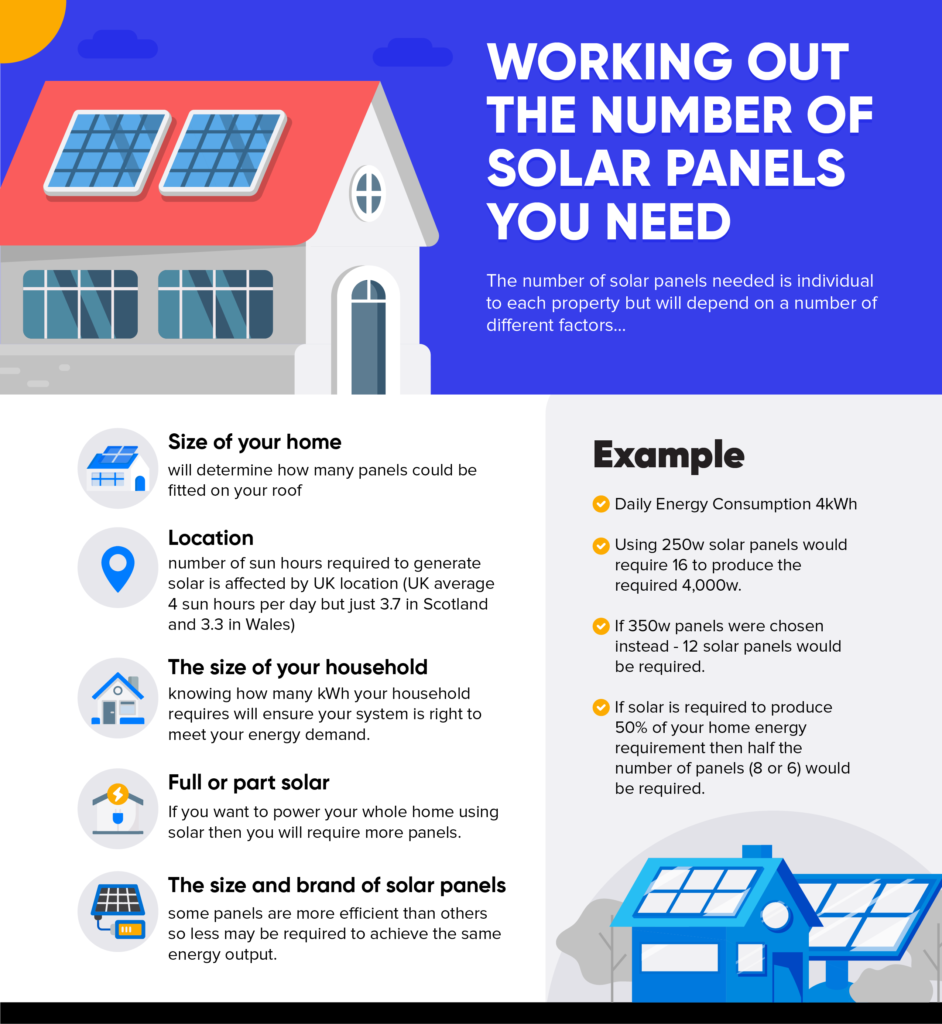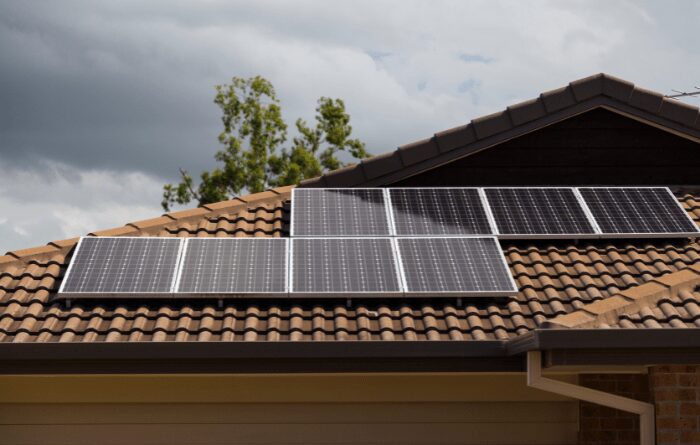If you’re looking to harvest solar power to save on energy costs, then you may be wondering how many solar panels do I need to provide the power needed to heat and run your home.
The number of solar panels that you need in the UK will depend on the location of your home and how many sun hours it is subjected to, the size of the property and how big the roof is, and finally, how much energy your household uses daily which is usually dependant on how many people live there.
Despite the British Weather not being the most reliable, solar power is an affordable way to run your home in a sustainable way that can offer huge savings on the price of electricity and gas and there are government-backed solar panel grants available to make solar energy affordable for everyone.

Get Help Installing Solar Panels
Solar Grants UK offers a completely free service to help homeowners and renters in the UK to access tens of thousands of pounds in grants available to them under the government-backed funding scheme to install solar power into your home.
The scheme means that solar panel installations can be completed for free or with a small contribution for millions of eligible people in the UK, which can save you money, make you money by selling your excess solar energy, and avoid escalating energy prices.
If you are a homeowner or private tenant, with a household income of below £31,000 or are currently receiving one or more income-related benefits, you are eligible for funding grants under the scheme that aims to improve low energy performance certificate (EPC) D to G rated homes through energy efficiency measures including Solar PV, loft insulation and underfloor insulation.
__________________________________________
Find out if you qualify for solar grants
__________________________________________
Read on for a simple overview of how to work out how many solar panels you are likely to need for your home, how to tell if your home is suitable for solar power, and how to access the solar grants available to you.
How To Work Out The Number Of Solar Panels That You Need

As the number of solar panels needed is individual to each property and household that wants to utilise solar energy, we can’t provide an exact answer to how many solar panels you will need, but we can share the following simple ways to help you calculate how many solar panels you could install at your home which include;
- The size of your home
- The location of the property and number of sun hours available
- The size of your household and how much energy is consumed
- Whether you want to go full solar or only create a proportion of the total energy needed to power your home
- The size and brand of solar panels
Size Of Your Home
Solar power systems aren’t small, so to know how many solar panels you need, one of the biggest factors is how many panels could fit on your roof, which itself will depend on the size, type and brand of solar panels used.
The number of panels that fit on your roof affects how much energy is generated by solar power and therefore the overall cost of installation vs the potential cost saving available from using eco-friendly energy sources.
For example, if you have a small roof, you may choose to install fewer solar panels that operate at a higher rate to gain the maximum solar power for your cash but if you have a larger roof, you could purchase a larger number of solar panels operating at a lower rate for example.
Your roof size and structure are also important because you will need to be certain that they can support the weight and positioning of the number of solar panels that you want to install.
Location Of Property And Sun Hours

To work, solar panels need, you’ve guessed it, sun! This means that the location of your home is an important factor in determining how many solar panels you need. The amount of energy that solar panels generate is affected by how many hours of sun are exposed. If you live in an area with fewer sun hours, then you may need more solar panels installed to meet the energy consumption of your home but if you have more available sun hours, then fewer panels will be needed.
Us Brits love nothing more than talking about the weather and sometimes it feels summer is over before it’s even begun, so, understandably, you may be wondering if the UK even has enough sun to make solar panels a viable option for creating your homes power needs.
On average, the UK has just over 4 sun hours a day. This varies by region though with England at the top end, Scotland with 3.7 and Wales with 3.3. Something that most people don’t realise is that solar panels can still generate energy on gloomy days and don’t need direct sunlight to work meaning that your home can still be creating its energy when the sun isn’t shining brightly.
Household Size And Energy Consumption
When working out how many solar panels you need for your home, probably the most important thing to consider is the amount of energy in KWh’s that you currently use or plan to use. Knowing your existing energy consumption means you can install a solar panel system that is the right size to meet the amount of energy you already use or at least go some way to covering a decent percentage of the energy you need if you decide to use solar power as part of a hybrid energy system for your home.
If you’re unsure what your energy consumption is, you can check your bills from your current supplier and use which should show how much you use. To give you a rough idea, an average UK home consumes between 3kWh and 6kWh of energy daily.
Solar panels come in 4Kw, 6KW or 5Kw systems with 6KW solar systems recommended for homes with over five people, 5Kw solar panel systems are suitable for homes with four people, and 4Kw systems are suited to homes with 3 or 4 people. This means that you would need 12 x 250 kW solar panels for a 3Kw system and 24 x 250w panels for a 6kW system.
Each solar system is made up of smaller 250w – 350w individual panels which each generate different amounts of energy. The output indicates how much energy is produced per sun hour, so a 250w panel would create 250w of solar energy per sun hour and a 300w panel would create 300w of solar energy per sun hour etc.
When you know the amount of energy that you need your solar panels to create, you can work out how many panels are needed for the solar system size you need based on the solar output of the size and brand of solar panels that you’re looking to install.
Full Solar or Partial Solar
When you know how much energy your home consumes on average each day, you can work out how many solar panels you need to cover the full amount of energy used, or you may decide to cover a percentage of your home’s energy needs from solar.
If you want to use solar energy to power your whole home without relying on any other energy source, then you will need more solar panels than if you only want to cover a percentage of your energy needs from solar energy.
Size & Brand
The number of solar panels you need will also be determined by the size and brand of the solar energy system that you use. Some brands will manufacture solar panels that are more efficient than others, meaning you need to install less to achieve the same energy output.
The material that solar panels are made from can vary too, with some being much more compact than others, which again, affects how much space will be needed to install them on your roof. Monocrystalline panels and polycrystalline panels are the most commonly installed type of solar energy systems.
The pros and cons of each of briefly summarised below:
| Monocrystalline solar panels | Polycrystalline solar panels | |
| Pros | Efficiency rating of 15-20% Take up less space Less affected by weather | Efficiency rating of 13-17% The cheaper option |
| Cons | Most expensive panel type Doesn’t perform as well in extreme temperatures | Lower energy efficiency Sensitive to high temperatures |
Worked Example To Calculate Solar Panels Needed
Now that we’ve given you an idea of the factors you need to consider to work out how many solar panels you need for your home, here is a worked example to put the information above into context:
If your home has a daily energy consumption of 4kWh or 4000 watts an hour and you installed 250 w solar panels, you would need to install 16 panels to achieve the 4000 watts daily consumption. If you used 350w panels, then 12 panels would be needed to achieve the 4000 watts daily consumption. If you only wanted to create enough solar energy to meet 50% of your home’s energy consumption, then you would only need 6 x 350w panels and 8 x 250w panels.
Related Questions
What Is A Solar Panel?
A solar panel is a set of photovoltaic sheets mounted on a frame that converts the sun’s rays into an electric current that can be used to power and heat a home from renewable solar power energy. You will often see solar panels on the roof of properties which allows the owner to capture the energy from daylight and convert it to electricity that can be used to power your home. By installing solar panels you will be generating your renewable energy and contributing to the drive to cut carbon emissions.
Benefits of Solar Panels
If you’re looking for a way to make your home more sustainable and cut your electricity bills, solar power offers a more cost-effective and environmentally friendly way to power your home when compared to fossil fuels and solar panels can offer the following benefits;
- You can create your renewable source of energy using the sun’s natural rays to provide electricity and hot water for your home without any harmful emissions entering the atmosphere
- You could cut your electricity bills significantly at a time when energy costs are rising
- Solar panels are quickly installed in a little as 1-2 days
- Solar panels are low maintenance and last for decades
- You reduce your reliance on the National Grid, meaning in the event of a power cut or gas shortage, you would still be able to heat and light your home.
- A simple way to cut carbon footprint
- Solar panels can add value to your property
- Solar panels work to generate energy, even on gloomy days as don’t need direct sunlight to work
- Government-backed grants are available to help with the cost of installing and operating solar panels under the ECO4 scheme and Smart Export Guarantee which are designed to encourage people to switch to solar power and help the UK meet its renewable energy targets.

Summary
We hope this article has given you a helpful overview of the things that you need to consider when asking ‘how many solar panels do I need?’
To recap, there is no one size fits all when it comes to the number of solar panels you need to install to benefit from solar power at your home. Instead, you will need to consider a range of factors including the size of your home and how much energy you use.
Things To Consider When Calculating How Many Solar Panels You Need
- The size of your home
- The location of your property and the number of sun hours available there
- The size of your household and the amount of energy you consume on an average daily basis
- How much of your home’s energy do you want to generate from solar power – all of it or a percentage?
- Size and brand of solar panels
When considering all of these things together, you can determine how many solar panels will be right for your home and if you’re already sold on solar power, we recommend following the simple tips when you’re ready to buy solar panels for your home.
- Check to see if you are eligible for a government-backed grant to cover the full or partial cost of installing solar panels at your home.
- Be aware that solar panels generate different amounts of energy depending on their wattage size or rating which affects the number you will need based on your average daily energy consumption
- Ensure your roof is large enough and strong enough to support the number of panels you need, which may require a survey first. Individual panels can weigh between 18 and 20kg each which will quickly add up when using 8 or more panels in your solar system.
- Solar panels come in different brands and sizes so shop around for the ones most suited to your home and budget.
If you’re ready to reduce your future electricity bills and generate 100% green energy, head over to Solar Grants UK to find out more.
